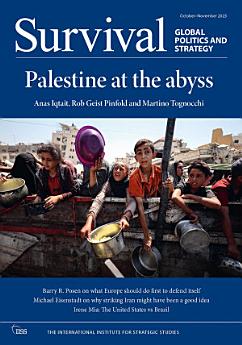Survival: October–November 2025
About this ebook
In this issue:
· Barry R. Posen maintains that European defence planners must extract maximum combat power from existing European force structures by way of a large force that can be dispatched quickly for maximum effect on Russian decision-making
· In the wake of the 12-Day War, Michael Eisenstadt argues that the key question is whether Israel and the United States can negotiate a broader and better nuclear deal with Iran and deter it from rebuilding its nuclear programme
· Nigel Gould-Davies reflects that international relations is in practice a craft rather than a science, in which individual choices and personal diplomacy are now more relevant than ever
· Marcel Berni and Marco Jorio assess the contradictions of Switzerland’s commitment to neutrality, and how the country might embrace a less rigid version for the contemporary security environment
· And nine other thought-provoking pieces, as well as our regular Book Reviews and Noteworthy column.
To read free articles from the journal, please visit its homepage at https://www.tandfonline.com/journals/tsur20.
Editor: Dr Dana Allin
Managing Editor: Jonathan Stevenson
Associate Editor: Carolyn West
Editorial Assistant: Anna Gallagher
About the author
The International Institute for Strategic Studies (IISS), a registered charity with offices in Washington, London, Manama, Singapore and Berlin, is the world’s leading authority on political–military conflict. It is the primary independent source of accurate, objective information on international strategic issues. Publications include The Military Balance, an annual reference work on each nation’s defence capabilities; The Armed Conflict Survey, an annual review of the world’s active conflicts; Survival, a bimonthly journal on international affairs; Strategic Comments, an online analysis of topical issues in international affairs; and the Adelphi series of books on issues of international security.




